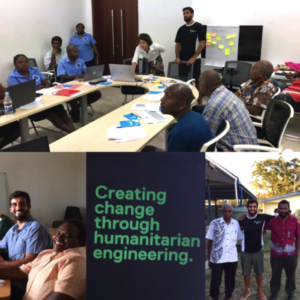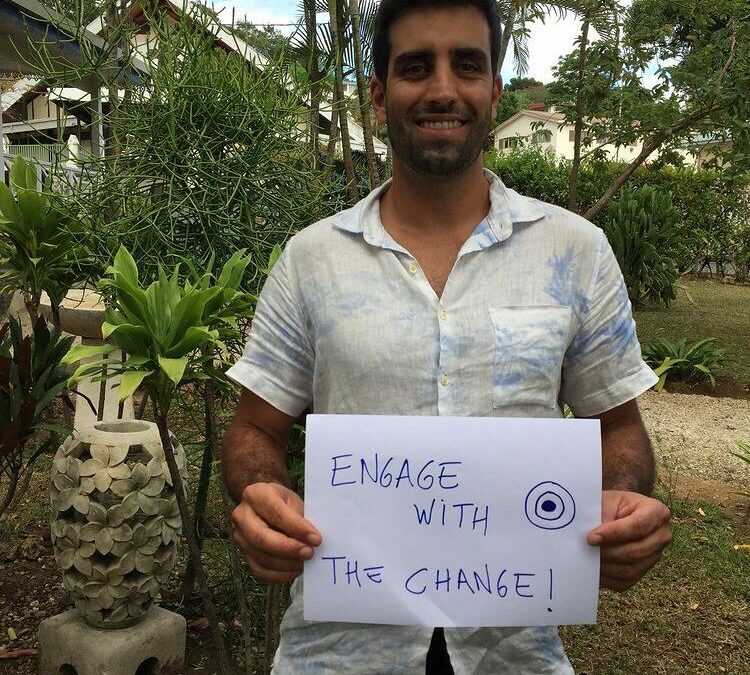The Amazon River contains one-fifth of the world’s surface-level water. With two-thirds of the river snaking through Brazil, the sheer mass of water would appear to support a flourishing ecosystem and the citizens of Brazil’s sprawling cities. However, a mix of city fumes, population growth and deforestation are weakening Brazil’s access to clean drinking and household water. Growing up in Brazil, Daniel Pires has seen this environmental impact first-hand.
Brazilians have limited water access, but the situation is humanly reversible. Amazonian rainforests that release humidity into the air for rain are being cut, while factory waste is dumped into rivers.
“I could not stand to see the urban creeks and waterways trashed and dying due to pollution contamination,” says Daniel. “Living in big cities back in Brazil, the pollution and poverty sadden me.”
Ecology to Engineering
Beginning his professional career in environmental education projects, Daniel was able to activate his passion for protecting the planet. However, Daniel wasn’t content with only observing and critiquing the natural environment without making meaningful changes. He wanted to make a difference by improving the lives of those in Brazil and beyond through better access to water and sanitation.
Daniel discovered he could combine his environmental passion with engineering. Calling this blend a “weird kind of engineer”, blending a civil engineering background with expertise in sanitation and the environment.
“Being an ecologist and only critiquing the system was not an option for me. I have to do something to work this out from inside the system to make positive change happen.”
In 2019, Daniel was selected as an EWB Australian Volunteers Program Field Professional. Soon after, Daniel was working in Vanuatu assisting the development of Vanuatu’s National Sanitation and Hygiene Policy. The policy was a collaborative effort, with EWB Australia and EWB New Zealand supporting the project with the Vanuatu Ministry of Health (MoH). Within Daniel’s policy development role, he was assisting the expansion of guidelines to rural Vanuatu communities. When COVID-19 hit in early 2020, Daniel was repatriated back to Australia and continued to support the MoH remotely.
Engineering waste reduction in the Pacific
In 2021, Daniel continues to support human development in the South Pacific region. In August this year, Daniel and EWB delivered the ‘Assessment of Alternatives to Disposable Diapers’ report involving Fiji, Kiribati, and Vanuatu. The report’s findings will be published soon and seek to reduce nappy waste in the Pacific region. Nappy waste represents 26% of the household waste found in Vanuatu. Once used, nappy waste releases E. coli and other bacteria that can cause diarrhoea and chronic illness particularly among children.
Through devising human-centred solutions in an environmental context, Daniel is supporting communities and the planet.

Daniel with the Ministry of Health team in Vanuatu
“I feel that my time and effort is transformed into something meaningful to improve lives while protecting natural resources and the environment,” says Daniel. “EWB has taught me how fundamental the human component is to the design of feasible solutions on the ground.”
Working together for the future
Daniel is hopeful for the future. He sees more people conscious of their impact on a planet that is increasingly under attack.
“Human beings have such an amazing capacity to make things happen,” emphasises Daniel. “I hope that we can work together to ensure all present and future generations can live in peace and harmony with nature and it’s animals.”
Daniel wants people to put aside personal differences for the benefit of greater causes. He emphasises the importance of human-centred engineering as a key tool towards a healthy future.
“EWB is the place to be if you want to learn while teaching and striving to improve the lives of communities,” says Daniel.
Maintaining human connection
It’s no surprise Daniel values family and friendship above all else. In 2020 amidst global lockdowns, Daniel ensured he would speak with his family in Brazil regularly.
“Due to COVID-19, I am afraid to see people stopping to hug, shaking hands and dancing together,” fears Daniel. “I pray to God that my children can live their life in communion and close convenience with other people.”
Fortunately for Daniel, he is back in Brazil visiting family and friends. He is cherishing the simple things in life with the people closest to him.
“A few weeks ago, I went camping with my family and friends on a remote and incredibly beautiful beach in Southern Brazil,” says Daniel. “I used to love going there before moving to Australia and dealing with COVID-19 travel restrictions.”
Despite Daniel’s travel, he emphasises his commitment to supporting a healthy future for Vanuatu.
“I developed a great connection with the MoH team and would like to finalise the national implementation of the sanitation and hygiene guidelines to improve health outcomes for Vanuatu citizens.”
Overcoming challenges through human collaboration
The global impact of COVID-19 highlights the collective challenges we face as a society. Resultantly, technology presents as a valuable tool to improve our lives during hardship.
“Working with overseas teams highlights that we all have similar problems to overcome and the solutions are available to those who want them,” explains Daniel. “We need to adapt to what is available for each situation and strive for the best.”
Daniel supports the human-centred approach embedded in EWB’s 2030 strategy, using technology solutions to complement the traditional understanding of local environments.
“I hope my contributions show communities that people can work together to overcome great challenges and enjoy the process.”
Volunteering with EWB is also assisting Daniel in his professional work environment.
“Volunteering brings me confidence that my skills and experiences are useful when the right opportunity comes,” explains Daniel. “It makes me realise that it’s important to be open to an ongoing learning process of self-development. This allows my creativity and innovation to flow in my professional work.”
While climate change and waste are impacting our planet, Daniel is one of many volunteers striving to protect our future. EWB is continually welcoming new volunteers who share a common ground for contributing to social change. Through an array of volunteering opportunities, EWB is a fantastic opportunity to engage in community-centred practice and expand your professional network.
If you’re interested in getting involved in our work, join a local Chapter to find out more, or register your interest to hear of future Australian Volunteer Professional Field Placements.


